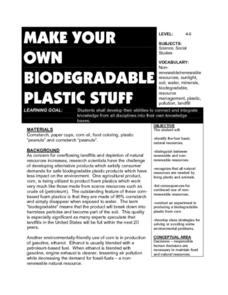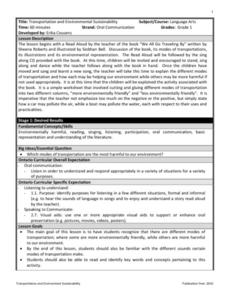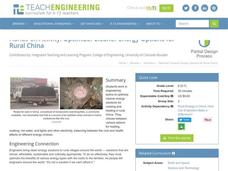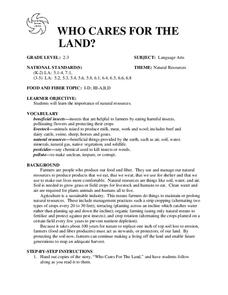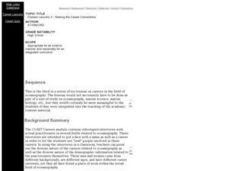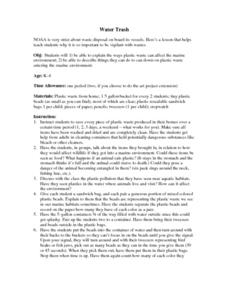NOAA
Seafood and Human Health
Whether your young biologists realize it or not, humans play a significant role in marine ecosystems. To help them understand this fact children first create graphical representations that show homo sapiens' place in marine food chains,...
Cornell University
Fibers, Dyes, and the Environment
Nanofibers can be made through electrospinning or force spinning in order to reduce the negative impact on the environment. Pupils study the role of fibers and dye on the environment through a series of five hands-on activities. Then,...
Curated OER
Local Environmental Issues: Pollution
Third graders discuss the ways in which human interaction with the environment and production of waste products contribute to pollution. Through a pollution demonstration, they explain how various groups of plants and animals can be...
Curated OER
Water Quality Monitoring
Pupils comprehend the four parameters of water quality. They perform tests for salinity, dissolved oxygen, pH and clarity or turbidity. Students comprehend why scientists and environmental managers monitor water uality and aquatic...
Curated OER
Make Your Own Biodegradable Plastic Stuff
Students identify the four basic natural resources. They distinguish bettween renewable and non-renewable resources. Pupils recognize that all natural resources are needed by living plants and animals. Students list consequences for...
Redefining Progress
Have and Have-Not
Is there a correlation between a country's wealth and the extent of its ecological footprint? What exactly constitutes an ecological footprint, and how does one country stack up against the rest? This is a unique lesson to incorporate...
Curated OER
Transportation and Environmental Sustainability
After listening to the book, We All Go Traveling By, 1st graders discuss different modes of transportation that they see out in the world, and the environmental impacts of each one. Kids work together to create a list of the types of...
Curated OER
Environment: Just Around the Bend
Students decipher landforms on a map and corresponding satellite imagery. They consider the impact of pollution on agriculture and water. They draw diagrams demonstrating how pollution works its way into the food source.
Curated OER
Land Use Change Introduction
Students discuss the major changes that have taken place in the Hudson Valley over the past 400 years. They use aerial photos to describe major trends in Dutchess County. Students view a PowerPoint presentation. They work in small groups...
Curated OER
Evaporation and Condensation
Young scholars explore how temperature affects the processes of evaporation and condensation.
Teach Engineering
Optimize! Cleaner Energy Options for Rural China
What are the trade-offs when looking to get the most benefit from an energy source? Small groups compare the cost-to-emission levels of several energy sources by looking at the information graphically. The groups utilize this information...
Curated OER
WHO CARES FOR THE LAND?
Students explore the importance of natural resources. They are given copies of the story, "Who Cares For The Land," and students follow
along as the teacher reads it. Students identify the key points in the story. (Soil, water and air...
Curated OER
Sustainable Island Development
Students explain how the basic human needs of a large group of people can be met. They describe and evaluate alternative methods for providing water and food, producing electricity, handling wastes, and transporting goods and people....
Curated OER
WHAT'S ORGANIC?
Learners explore how certain foods come to be certified "organic." They write the words "organic" and "synthetic" and given the definitions of each. Students are given dictionaries. They are asked: "What is organic food?" Learners grow...
Science Matters
That’s An Otter Story
Young scientists discover how sea otters' habitats have changed due to human impact. Through conversation, video observation, and story reading, scholars identify how human interactions change a specific ecosystem in both positive and...
Curated OER
Science: Making Career Connections
Students explore careers in oceanography. They compare and contrast requirements for careers in the field, and determine what high school courses would help to prepare them. Finally, they create a computer-based project related to...
Curated OER
Water Trash
Students examine how plastic waste affects the marine environment. They describe techniques that reduce plastic waste in this environment after examining plastic waste that accumulates in their own homes.
Curated OER
People Who Work in the Woods
Students study the types of jobs that people can do in the forest. They examine those who study the forest, harvest the trees, and plant trees to renew the forest.
Curated OER
Help! Someone Has Destroyed My Home!
Fifth graders use a mystery bag to discover ways in which humans endanger the life of animals by changing their habitat. In this animal habitat lesson, 5th graders work with a partner to design a solution to the problem of habitat...
Curated OER
Erosion
Fifth graders study the effects of running water on erosion. They examine how the soil on the playground is affected by erosion and determine how the placement of trees and shrubs changes the path of erosion. In their science journals,...
Curated OER
Clean, Green Power
Students explore and discuss alternative energy sources, and identify disadvantages of current fossil fuels.
Curated OER
The Chesapeake Bay in Captain John Smith's Time
When Captain John Smith visited the Chesapeake Bay in the summer of 1608, what types of animals and habitats did he encounter? Your young historians will analyze primary source documents to answer this question, as well as compare the...
Pulitzer Center
Extractive Industries
Here is a chance for environmental studies classes to take a critical look at crises occurring around the globe by reading articles and viewing video clips. The human activities under scrutiny are the extraction of oil, logging, and...






